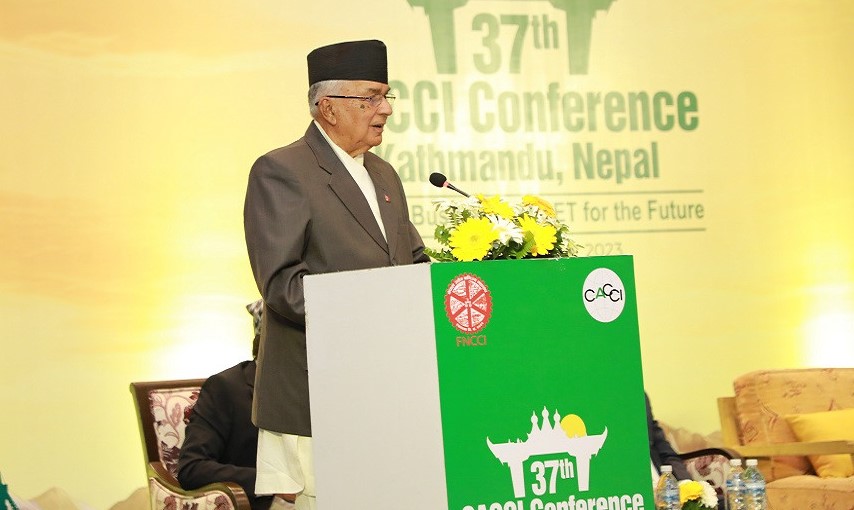KATHMANDU: President Ramchandra Paudel extended a warm welcome to international industrialists and business leaders, encouraging them to consider investment opportunities in Nepal’s burgeoning agriculture, tourism, and energy sectors.
The call to action was made during his inaugural speech at the 37th Cassi Conference, a collaborative initiative between the Asia Pacific Regional Confederation of Commerce and Industry and the Federation of Nepal Chamber of Commerce and Industry, spanning two days.
President Paudel noted that the investment landscape in Nepal is expanding, with regulatory frameworks evolving to facilitate foreign and domestic investments alike. “I invite international industrialists and business leaders to explore opportunities in Nepal’s agriculture, tourism, and energy sectors,” he emphasized.
Highlighting the rich tapestry of natural resources in Nepal, including fertile lands, abundant water resources, and the allure of its tourism sector, President Paudel emphasized the nation’s strong commitment to economic development and its desire to integrate more extensively with the global economy.
One promising avenue for investment in Nepal is the electric power sector, which is increasingly connecting with neighboring India and Bangladesh.
Recent developments in electricity trade have created a vital opening for entrepreneurs interested in investing in hydropower projects. “I encourage all of you to consider investments in Nepal’s hydropower sector,” President Paudel affirmed.
In light of the recent earthquake in Jajarkot, President Paudel appealed to entrepreneurs and business leaders to assist the victims by offering their support and compassion.
President Paudel also highlighted the vital role that small and medium-sized enterprises (SMEs) play in Nepal’s economy. He stressed that sustainability is not just a contemporary buzzword but a cornerstone of the nation’s future. SMEs are instrumental in fostering economic growth, innovation, and employment.
Furthermore, President Paudel underscored that entrepreneurship is more than just launching businesses; it provides a sturdy foundation for innovation, diversity, and tackling the community’s most significant challenges. “I have full confidence that you will uphold these values and contribute to their ongoing development,” he expressed.
Sustainable entrepreneurship and business, President Paudel stressed, are pivotal for Nepal’s prosperous and sustainable future. They not only fuel economic growth but also establish and uphold cross-border relations. Services offered by business organizations, such as mediation, process digitalization, and networking opportunities, serve as crucial tools that connect businesses with the global community.
President Paudel expressed optimism that entrepreneurship and trade will fortify global multilateralism and foster global peace through mutually beneficial relationships. Nepal’s strategic geographical location between China and India positions it as a natural gateway for businesses seeking access to vast consumer markets.
Nepal’s membership in regional trade agreements, including the South Asian Association for Regional Cooperation (SAARC) and the Bay of Bengal Initiative for Multisectoral Technical and Economic Cooperation (BIMSTEC), facilitates access to an extensive network of trade partners across the region.
Nepal boasts an active, disciplined, and peace-loving labor force, which presents an attractive asset for businesses seeking skilled labor, innovation, and entrepreneurship. The nation’s growing middle class has emerged as a promising consumer market with vast opportunities spanning retail, consumer goods, and services.
President Paudel expressed confidence in Nepal’s diverse natural landscape, highlighting its enormous potential in the tourism sector. Investments made in this sector today are poised to yield substantial dividends in the future. He also identified information technology, manufacturing, and agriculture as sectors ripe for investment and urged stakeholders to consider expanding their contributions.
Ultimately, President Paudel concluded that the conference’s theme is not only a global concern but also central to Nepal’s economic development and sustainability.

